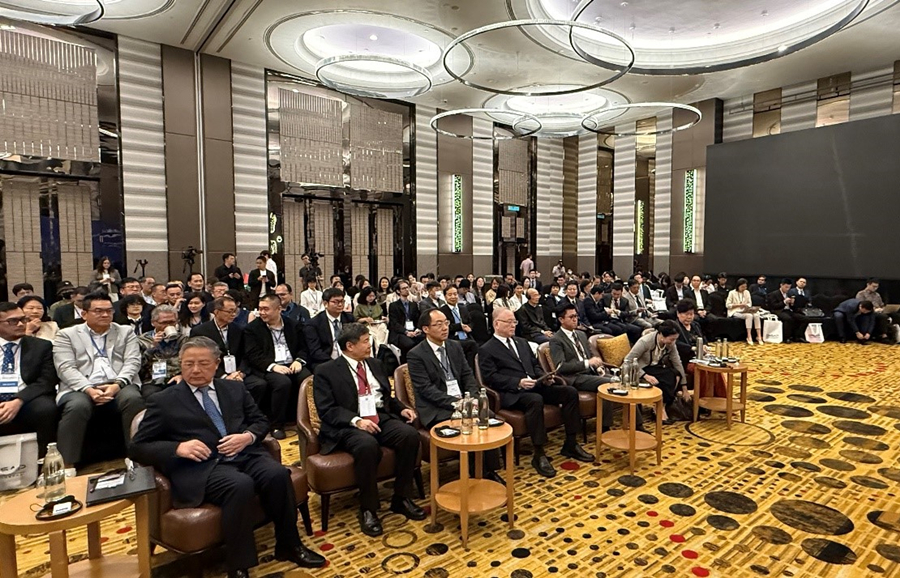
 0 Comment(s)
0 Comment(s) Print
Print E-mail China.org.cn, April 20, 2025
E-mail China.org.cn, April 20, 2025
More than 20 Chinese and Malaysian think tank experts and scholars gathered in the Malaysian capital on April 17 for the "Envisioning the Future: Kuala Lumpur Dialogue," focusing on new opportunities for economic cooperation between the two nations.

Yu Yunquan, vice president of China International Communications Group and president of the Academy of Contemporary China and World Studies, speaks at the "Envisioning the Future: Kuala Lumpur Dialogue" held in Kuala Lumpur, Malaysia, April 17, 2025. [Photo courtesy of ACCWS]
The event was co-organized by the Academy of Contemporary China and World Studies (ACCWS) and the Institute of Strategic Analysis and Policy Research, with support from the Fusion Institute, Malaysia-China Welfare Advisory Society and Bait Al-Amanah. About 200 participants from government agencies, think tanks, universities and businesses from both countries attended.
Yu Yunquan, vice president of China International Communications Group (CICG) and president of the ACCWS, said in his opening speech that think tanks, as thought leaders, public opinion shapers and exchange facilitators, can strengthen China-Malaysia and China-ASEAN cooperation by researching practical approaches for development strategy alignment, guiding mutual public understanding between the two countries, and building multilateral dialogue platforms.
"CICG is ready to work with its Malaysian partners to enhance information dissemination, knowledge sharing and youth exchanges, strengthening people-to-people bonds for building a China-Malaysia community with a shared future," Yu said.

Datuk Dr. Pamela Yong, chairwoman of the Institute of Strategic Analysis and Policy, speaks at the "Envisioning the Future: Kuala Lumpur Dialogue" held in Kuala Lumpur, Malaysia, April 17, 2025. [Photo courtesy of ACCWS]
Datuk Dr. Pamela Yong, chairwoman of the Institute of Strategic Analysis and Policy, said current protectionist trends and growing geopolitical competition among major powers highlight ASEAN's urgent need for strategic reassessment.
"Diversification serves as a shield against uncertainty, creating opportunities, stimulating growth and enhancing resilience," she said. "China remains a crucial partner for Malaysia and ASEAN in pursuing strategic diversification. Both sides should fully explore cooperation potential in the digital economy, green development and connectivity to achieve inclusive regional prosperity."
YB Datuk Seri Ir. Dr. Wee Ka Siong, Malaysian lawmaker, Malaysian Chinese Association president and former transport minister, said China-Malaysia relations show rare clarity and predictability amid global geopolitical fragmentation and rising protectionism.
"With the gradual alignment between the Belt and Road Initiative and Malaysia's national development plans, I have confidence that both nations will continue working together as key anchors for regional peace and progress," he said.
He also proposed establishing the "Envisioning the Future" dialogue as a permanent annual platform for think tank cooperation and exchanges between the two countries.
In his keynote speech, former Chinese Vice Finance Minister Zhu Guangyao said China and Malaysia are leveraging their digital and green economies as engines to jointly implement the strategic consensus between their leaders on building a community with a shared future, accelerating cooperation for a "new golden 50 years."
"China's deepening trade with Malaysia and ASEAN reflects the inclusive, equitable and shared development path of economic globalization, proving that protectionist backpedaling cannot reverse the historical trend of globalization," he said.
Zhu suggested advancing the China-ASEAN Free Trade Area 3.0 and regional financial safety net, while steadily enhancing the Chiang Mai Initiative's effectiveness in addressing potential liquidity shocks and maintaining regional economic growth momentum.
Hu Zhengyue, former assistant minister of foreign affairs of China, said in his keynote speech that China-Malaysia trade has grown nearly twentyfold over the past two decades, now accounting for one-fifth of total China-ASEAN trade.
"The achievements in China-Malaysia cooperation stem from four pillars, which are strong political relations as the foundation, robust people-to-people networks as the bridge, substantial market demand as the base, and regional collaboration as the driving force," he said. "With certain major powers' policies potentially causing severe global governance failures, China must coordinate responses with both ASEAN and Malaysia to maintain positive trade momentum, upgrade industrial cooperation, tap infrastructure and tourism potential, and better safeguard shared interests to expand our cooperation."

Participants listen to speeches during the "Envisioning the Future: Kuala Lumpur Dialogue" in Kuala Lumpur, Malaysia, April 17, 2025. [Photo courtesy of ACCWS]
Experts also participated in two plenary sessions and a roundtable discussion. The sessions focused on regional cooperation and economic revitalization to advance ASEAN's stability and prosperity, along with cultural integration and intellectual exchange through education and the arts. The roundtable discussion explored joint efforts toward peaceful development.
Chinese and Malaysian experts agreed that strengthened China-Malaysia coordination and deeper regional cooperation would help ASEAN address geopolitical challenges while advancing economic integration and sustainable development.
China and ASEAN can strengthen regional resilience and create mutual benefits by expanding their collaboration in digital technology, green economy and connectivity despite current global uncertainties, experts said.
They stressed enhancing cultural-educational ties through resource-sharing, youth exchanges, university research and arts cooperation to strengthen regional cultural affinity. Multi-faceted people-to-people exchanges are crucial for building trust and supporting a united, inclusive Asian community with a shared future, they noted.
Yu concluded the dialogue event by expressing hope that amid complex global changes, think tanks should uphold the principle of seeking common ground while shelving differences, finding consensus amid divergences and resolving disputes through shared understanding. He stated that China and Malaysia think tanks must deepen cooperation to inject certainty and new momentum into bilateral collaboration.